Menendez Brothers: Could Erik and Lyle be resentenced? LA DA makes major announcement
Menendez Brothers: DA reviewing new evidence in the case
Los Angeles County District Attorney George Gascón said Thursday his office is actively reviewing the case of Erik and Lyle Menendez, who were convicted of killing their parents in Beverly Hills in 1989, in light of renewed allegations of sexual abuse by their father.
LOS ANGELES - The case of the Menendez brothers is one of Southern California's most notorious murder cases. Lyle and Erik Menendez have been in prison since they were convicted in 1996 of killing their parents, José and Mary (Kitty) Menendez in Beverly Hills in 1989.
The brothers have been serving a life sentence without the possibility of parole. They have repeatedly appealed their convictions to no avail. Now, there may be a new-found hope for Lyle and Erik, as Los Angeles County DA George Gascón announced Thursday that he will be reviewing the brothers' cases in light of "new evidence" supporting the brothers' molestation claims.
Gascón said attorneys in his office are reviewing the possibility the Menendez brothers could be entitled to have their case reheard or to be resentenced. He said he is "not leaning in any direction right now. I'm keeping an open mind."
Menendez Brothers: LA DA makes major announcement
There may be a new-found hope for Lyle and Erik Menendez, as Los Angeles County DA George Gascón announced Thursday that he will be reviewing the brothers' cases.
Gascón said it is too soon to determine whether the result will be a resentencing, but added that the brothers have a hearing coming up on Nov. 29.
"We have people in the office that are looking at this very carefully, very experienced lawyers that are looking at this. That evidence will be presented to me. Their recommendations will be presented to me, but the final decision will be mine," Gascón said.
Menendez Brothers' attorney makes statement
An attorney for the Menendez brothers' spoke following the announcement that the LA County District Attorney's office will review the brothers' cases.
New evidence in the Menendez Brothers' case
"We have been given a photocopy of a letter that allegedly was sent by one of the brothers to another family member talking about him being the victim of molestation," the district attorney said. "We've also got evidence that was provided by the defense, by his lawyers, that one of the members of the Menudo band alleged that he was molested by the father. None of this information has been confirmed. We are not at this point ready to say that we either believe or do not believe that information."
The court papers filed by defense attorneys last year included a copy of the handwritten letter allegedly sent by Erik Menendez to his cousin, Andy Cano, in early 1989, before the gruesome murders. Attorneys contend the letter was only recently discovered by Cano's mother. Cano, who died of a drug overdose in 2003, testified in the brothers' first trial that Erik Menendez had told him about the molestation by his father when Erik was 13 years old, according to the court documents.
In the letter, Erik Menendez writes in part, "I've been trying to avoid dad. It's still happening Andy, but it's worse for me now. I can't explain it. ... I never know when it's going to happen, and it's driving me crazy. Every night I stay up thinking he might come in. I need to put it out of my mind."
In court papers, Menendez brothers attorneys Geragos and Cliff Gardner wrote that the new evidence "not only shows that Jose Menendez was very much a violent and brutal man who would sexually abuse children, but it strongly suggests that -- in fact -- he was still abusing Erik Menendez as late as December 1988. Just as the defense had argued all along."
The other piece of new evidence was the sexual assault allegation from Menudo member Roy Rosselló. Rosselló claims that Jose Menendez drugged and raped him when he was a member of the iconic Puerto Rican boy band in the early 1980s.
RELATED: The untold story of the Menendez family & murder case
Following Gascón's press conference, the Beverly Hills Police Department (BHPD) issued the following statement:
"Erik and Lyle Menendez were sentenced to life in prison without the possibility of parole in July 1996 after being convicted of two counts of murder and conspiracy in the deaths of their parents, José and Kitty Menendez. As the investigating agency for the case, the BHPD presented facts and evidence to the Los Angeles County District Attorney's Office at that time, who proceeded with filing criminal charges.
To date, BHPD has not been contacted by the Los Angeles County District Attorney's Office regarding these new developments.
BHPD remains committed to transparency and working collaboratively with all agencies to pursue justice."
Erik and Lyle never denied carrying out the killings, but contended they were repeatedly sexually assaulted by their father and feared for their lives.
Since 2021, videos all over social media and a group of TikTokers that call themselves the "Menendez Defenders and Guardians" – have been working to overturn the conviction and free the brothers.
"They didn't kill their parents for money. They were in fear of their lives," Erin Dunleavy, a Menendez Defender said in a previous statement to FOX 11.
The young supporters sent letters to Gov. Gavin Newsom and Gascón, explaining they've studied the case and believe the justice system got it wrong. Just last year, attorneys for the brothers filed court papers contending that newly surfaced evidence warrants the overturning of the brothers' convictions.
Group of TikTok users leading push to free Menendez Brothers
TikTok users are leading an online push to free Lyle and Erik Menendez, two brothers convicted of killing their parents in Beverly Hills.
PREVIOUS COVERAGE:
- Menendez Brothers: Testimony of Lyle and Erik Menendez, and the trial marred by wealth and abuse
- Citing new evidence, Menendez brothers look to overturn murder convictions
- True Crime Files: Group of TikTok users leading push to free Menendez Brothers
- True Crime Files: New images show the Menendez family during happier times
- Former Menudo member alleges he was drugged and raped by father of Menendez brothers at 14-years-old
Menendez brothers show renews interest in case
'Monsters: The Lyle and Erik Menendez Story' premiered on Netflix, sparking new interest in one of the most high-profile murder cases in Los Angeles' history.
There has recently been a renewed interest in the case following the release of Netflix's "Monsters: The Lyle and Erik Menendez Story." Later this month Netflix also plans to release a documentary titled, "The Menendez Brothers," that shares Erik and Lyle’s side of the story.
A look back at the infamous Menendez case
José and Kitty Menendez were found shot to death inside their Beverly Hills mansion on August 20, 1989. The couple's deaths shocked the world. Investigators said Lyle Menendez had called 911, crying hysterically and telling the operator his parents had been killed.
True Crime Files: The Menendez Brothers
The faded photographs show a family who appeared to have it all. Jose, Kitty, Lyle and Erik Menendez all smiling at birthday parties, Christmas morning and enjoying vacations.
The case drew significant media attention due to the family's wealth, the gruesome nature of the killings, and the defense's strategy during the trial. The courtroom became a battleground of narratives, pitting accusations of cold-blooded murder for inheritance against claims of self-defense rooted in a history of abuse.
Father José was an entertainment executive, and mother Kitty was a former beauty queen.
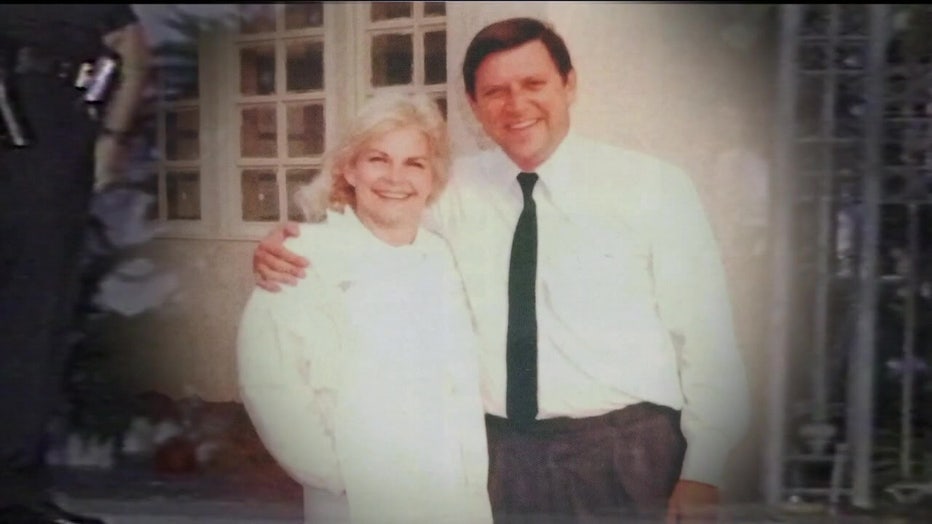
Jose and Kitty Menendez. (KTTV Archives) (FOX 11)
At first, there was speculation the mob had committed the brutal slayings. But soon, a true picture emerged — revealing the real killers were the victim’s two sons, Lyle and Erik Menendez.
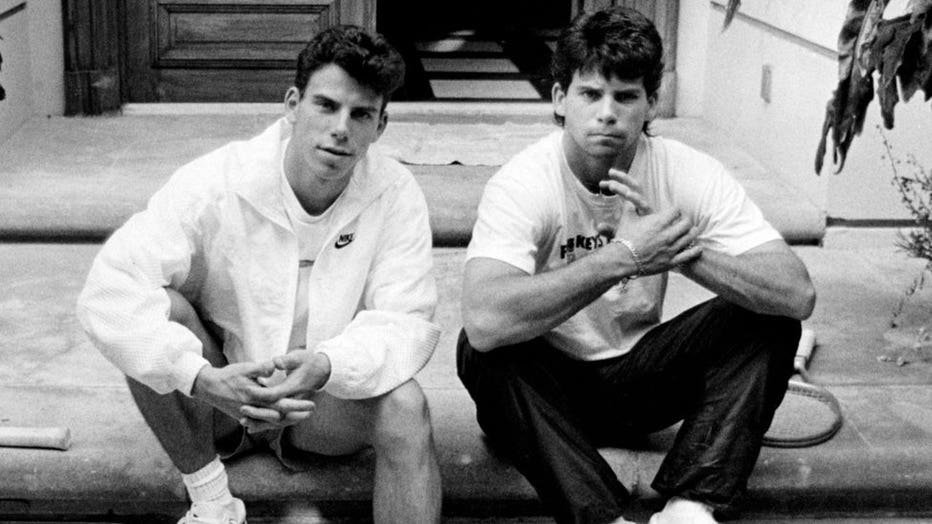
Menendez brothers, Erik, left, and Lyle, right, on the steps of their Beverly Hills home in November, 1989. (Ronald L. Soble / Los Angeles Times via Getty Images)
Menendez brothers’ abuse claims
The brothers never denied carrying out the killings, but contended they were repeatedly sexually assaulted by their father and feared for their lives. As a result, defense attorneys argued that the brothers "did not harbor the mental state needed for first-degree murder and were therefore guilty of manslaughter."

Lyle Menendez and Erik Menendez with their father, Jose Menendez. (KTTV Archives) (FOX 11)
Prosecutors, however, said the killings were motivated by greed, pointing to lavish spending sprees by the brothers after the killings, and arguing they were guilty of first-degree murder.
News clippings from the trial detailed how the teenagers' involvement in tennis and other activities masked deeper issues within the Menendez household.
During the trial, former coaches and teachers painted a picture of José Menendez as an overbearing figure, inciting numerous anecdotes about his treatment of his sons. Witnesses like Lyle's former tennis coach, depicted José as a strict parent who demanded excellence, especially on the tennis court. Another coach who testified noted the elder Menendez's relentless drive. Whether disrupting his sons' tennis lessons or expressing dissatisfaction with their academic performance, José's intense pressure was evident, the court heard.
Erik, seen as the lesser-favored son, faced his own battles. Struggling academically with a learning disability, he was denied special help by his parents. Teachers from his prep school attested to the pressures placed on the Menendez brothers, with suspicions that the heavy tennis commitments resulted in others doing their homework for them.
Lyle Menendez's emotional testimony peeled back layers of their childhood, revealing disturbing memories of being exposed to sexually violent content and claims of sexual abuse by their father.
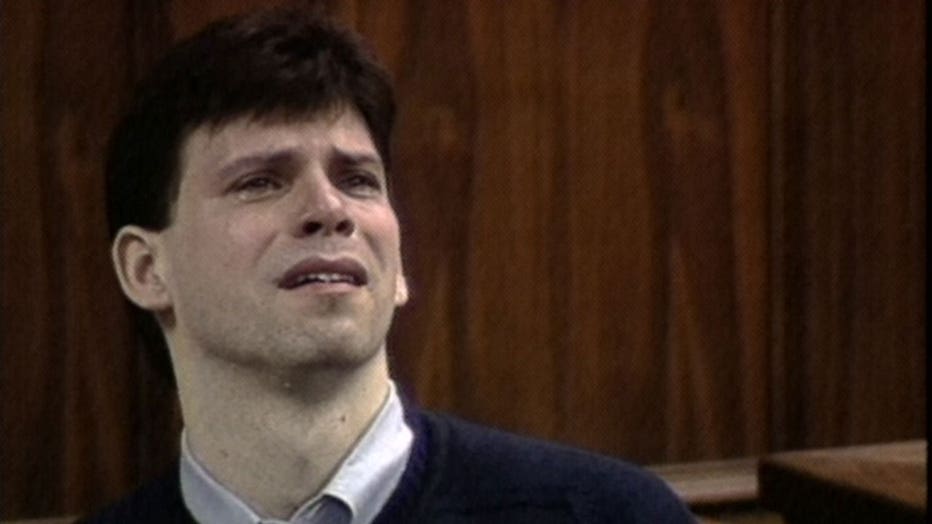
Lyle Menendez. (KTTV Archives) (FOX 11)
His defense attorney, Jill Lansing, led him through a recounting of his childhood under the harsh rule of his father and a distant mother who told him he had ruined her life. It was within these details that the defense argued for understanding the brothers' mindset. Lyle described being pushed into rigorous sports training, discouragement from socializing, and punishment for minor infractions. The court also heard of darker testimonies, including sex between men being openly discussed, sexually violent, pornographic movies, and allegations of sexual molestation by José, depicted through naked photos of young Lyle.
Lyle told the court that his childhood abuse began when he was six years old, at their home in New York. He said that the sexual interactions with his father became more intense when he was seven and broke down after nearly two hours of testimony about the abuse. Lyle said his father stopped molesting him when he was eight. About the time he said, José Menendez started having sex with Erik.
Group of TikTok users leading push to free Menendez Brothers
TikTok users are leading an online push to free Lyle and Erik Menendez, two brothers convicted of killing their parents in Beverly Hills.
During Erik's testimony, he talked about his abuse, stating, "I just wanted to die… Life no longer mattered. And I didn't know what to do. I thought of telling Lyle… I thought I couldn't do that — that it would be too embarrassing, and that I couldn't admit it."
Erik revealed to Lyle that he had been molested for years after a fight with their mother, which occurred six days before the brothers killed their parents, making Lyle angry. Lyle was confused and upset about why Erik never resisted or told anyone about the ongoing molestation and questioned Erik's reactions to the abuse. Erik and Lyle agreed to confront their father about the molestation three days prior to the killings, but the confrontation did not yield a positive outcome. During the confrontation, Lyle threatened to expose their father, who in turn went to Erik's room and implicitly threatened him for telling Lyle about the abuse. Erik testified that José threatened Erik for telling Lyle about the molestation and stated that he would not let Lyle tell anyone else.
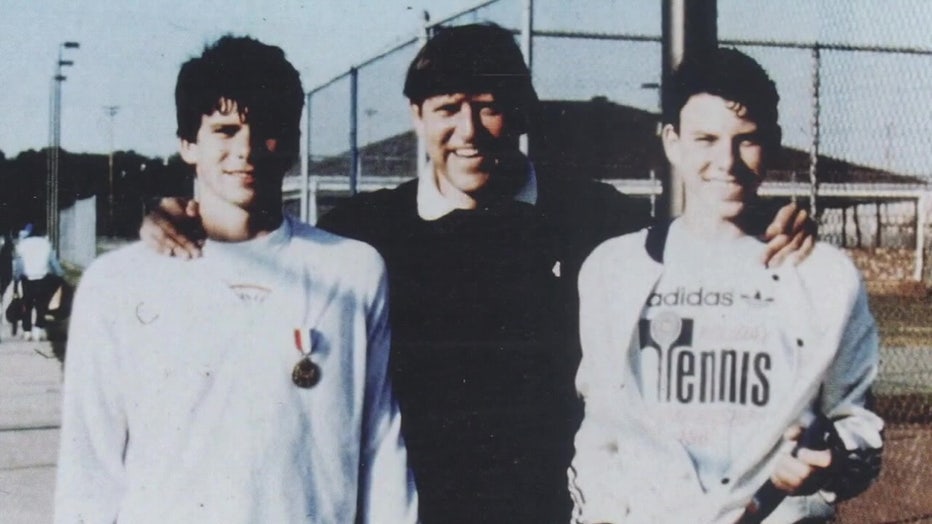
Lyle Menendez and Erik Menendez with their father, Jose Menendez. (KTTV Archives) (FOX 11)
When directly asked, Erik implied that his father had previously threatened to kill him if he ever told anyone about the molestation. Erik testified that he believed that his father and mother posed a threat to his and Lyle's lives, with his mother being seen as complicit in the potential violence. Erik interpreted his mother's statement about things possibly working out if he had kept quiet as an indication that she was involved in a plan to harm them.
Amid Lyle's testimony, he claimed that he and Erik had acted under the belief that their lives were at risk. Prosecutors probed Lyle for indications that his actions were inconsistent with genuine fear, including not expressing concern about his mother's rifles and the brothers' failure to seek police assistance. The prosecution pointed to lavish purchases made in the wake of the murders — a stark contrast to claims of self-preservation.
During an intensive cross-examination, Lyle maintained that the shooting unfolded in a moment of panic, fearing that an argument with their parents was a precursor to their planned deaths. Prosecutors challenged the narrative using a detailed floor plan of the mansion, raising questions about the consistency and believability of Lyle's version of events.
As the trial progressed, a key focus was the brothers' confessions to Dr. Jerome Oziel, their psychotherapist. During the trial, his testimony faced legal controversy due to concerns about patient-client confidentiality. The prosecution aimed to use his statements to pursue the death penalty, while defense attorney Leslie Abramson challenged Oziel’s credibility and ethical practices, citing a complaint from the state psychology board.
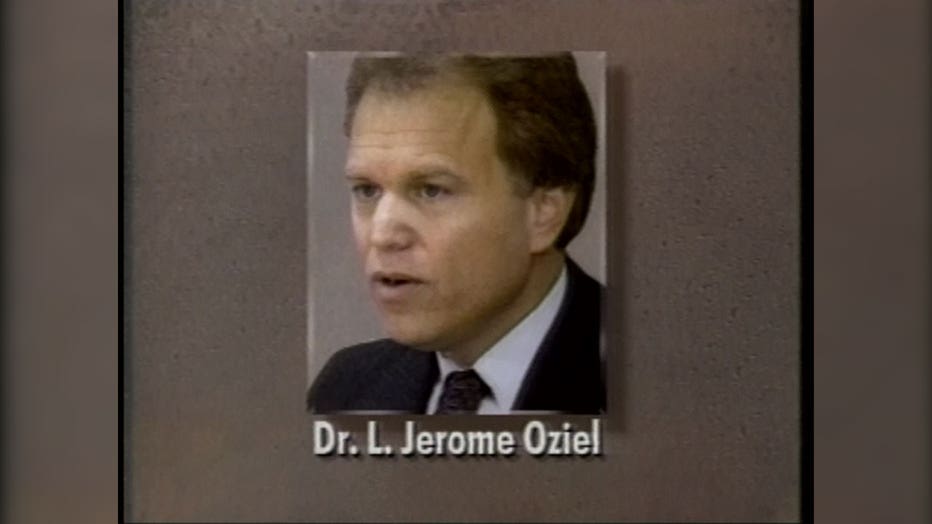
Dr. Jerome Oziel was a key part of the Menéndez brothers' trial. (KTTV Archives) (FOX 11)
During his testimony, Oziel said that Erik Menendez confessed that he and his brother murdered their parents. Oziel’s girlfriend overheard the confession and, concerned for her safety, went to the police.
The prosecution argued that the murders were premeditated and driven by greed, pointing to the brothers’ extravagant spending after their parents’ deaths. Following the murders, Lyle and Erik began using their parents' money to buy luxury cars, expensive clothing, and even to go on lavish trips. This sudden spending spree raised suspicions, as the brothers seemed unaffected by their parents’ deaths.
Fast-forward to closing arguments, where Prosecutor Pamela Bozanich aimed to center the narrative firmly on the aspect of greed, steering it away from the allegations of child abuse. Bozanich characterized the brothers as murderers, not victims, accusing the defense of employing the abuse storyline as a strategic diversion. The defense contended that understanding the alleged abuse was imperative, with Lyle's testimony serving to illustrate the oppressive atmosphere allegedly catalyzing the fatal night.
Despite the defense's efforts, who implored the jury to look beyond the brothers' affluent background, Bozanich countered fiercely. She presented contrasting stories of abuse survivors who did not resort to killing, subsequently painting Kitty Menendez in a more compassionate light. The goal was explicit — to reclaim the Menendez parents' reputations.
After weeks of deliberations, jurors in both Erik and Lyle's trials told Judge Weisberg that they could not agree on a verdict, resulting in a mistrial. Los Angeles District Attorney Gil Garcetti immediately announced that the Menendez brothers would face a second trial for first-degree murder, with no possibility of plea bargaining.
In 1995, the brothers were retried, but this time the judge did not allow cameras in the courtroom and placed limits on the defense's presentation of evidence regarding the abuse allegations. During the second trial, the brothers were found guilty of first-degree murder of both their parents and conspiracy to commit murder. Both brothers were sentenced to life in prison without the possibility of parole. The Menendez brothers remain in prison, where they have been serving their sentences since 1996.
CNS contributed to this report.

